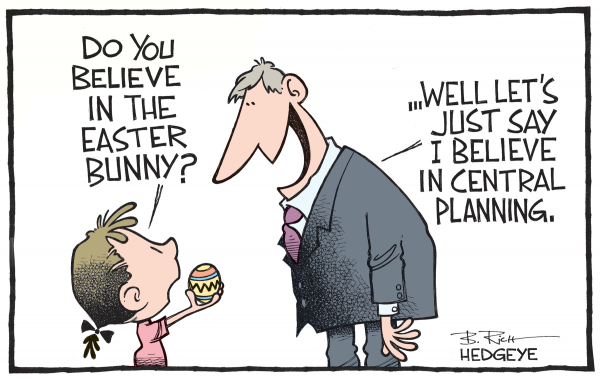
Image Source: https://steemit.com/government/@thinker/why-government-central-planning-will-always-fail
Throughout the publication, Hayek warns that by abandoning freedom in economic affairs, personal and political freedom cannot exist. By following the form of economics that allowed a central planning committee to control markets, the fall to a dictatorship would follow closely behind. Although socialism looked attractive at the time, it would be detrimental to entrepreneurial freedom and individual freedom for consumers and citizens. I think this ties in well with our discussion of socialism and how destructive it can be for consumers and entrepreneurs. However, Hayek went further than rejecting socialism, he believed that it would lead to a dictatorship like Soviet Russia or Nazi Germany. Below are the foundational principles of entrepreneurship that I think were most relevant to The Road to Serfdom.
Competitive Markets
Hayek is very passionate about his support for competitive markets. With central planning involved, these competitive markets would not be able to exist. People pictured central planning as a method to bring a country together, but a competitive market is the only effective way to guide individual efforts and create a market that works for everyone. Without competition, individual freedoms would be restricted. A competitive market also does not require the intervention of authority, as would occur in a market created by central planning.
Hayek does not believe that a competitive market would be successful without any kind of intervention from authority. He believed that authority and restrictions on competition still needed to exist to enforce proper conditions for workers and to break up monopolies. Hayek was strongly against monopolies and believed that a country’s needs could not always be met when they exist. The variety of opportunities for entrepreneurs is greatly reduced with monopolies and a lack of competition. I think this counters Bylund’s argument from last week that monopolies cannot stop entrepreneurs from continuing to be innovative and create alternative products or solutions. I would be interested in hearing more about what has changed about monopolies from the time that Hayek was referencing it to now. Hayek seemed to think that free and competitive markets could not exist while monopolies were in place, but Bylund believes that they can as long as the monopolies don’t have too much power. I wonder if Hayek meant that all monopolies should be banned, or if he also meant that they can exist as long as they don’t have too much power.
Hayek also points out that the pricing system already in place allows entrepreneurs to account for the demand for goods and services and adjust their work to fit into the changes in pricing. He means that there is no need for a central planning committee to come in and control prices. In a competitive market, pricing will typically work itself out without too much intervention. Entrepreneurs also have the ability to watch prices and therefore set their own compared to what is selling in the market. Overall, competition and central planning cannot work together, and there is no need for central planning when competition exists.
Power Balance
Hayek was very against the idea of central planners having so much power. They would have a disproportional amount of power over society, especially when it comes to entrepreneurship and the ability to compete in markets. He believed that a competitive system was the only way to minimize the power of a small group of people that had excess control over markets. I think a good quote from the essay that book that summarizes his views on power balance is “There is, in a competitive society, nobody who can exercise even a fraction of the power which a socialist planning board would possess”. This shows how a centralized planning group would contain too much power and would limit the freedoms and opportunities for entrepreneurs and the freedoms of consumers. This disproportionate power balance would exclude newcomers from markets, reduce opportunities for entrepreneurs, and limit the power of consumers to make their own decisions.
Alignment of Incentives
Hayek was highly concerned about the policies that could potentially be put in place that would fail to improve overall societal well-being and negatively affect free markets. He shows that monopolies are often the result of public policies that promote and protect them. He viewed the policies that intervened with the free market as destructive to free exchange and the freedom of entrepreneurship. In his eyes, a central planning group would start by limiting markets, and then progress to create more and more policies until their countries fell to the same fate as Nazi Germany or other dictatorships. Instead of improving the societies that they were supposed to protect, the misaligned incentives that a central planning committee would implement would decrease freedoms for the public.
Overall, Hayek’s fears about Western countries, such as the United States and the United Kingdom, becoming dictatorships did not come true. The socialism and central planning committees that he warned against did not take over control of economic-decision making. However, I think that his points about central planning still exist. Without free and competitive markets, there would be a decrease in individualism and freedom to make our own decisions.